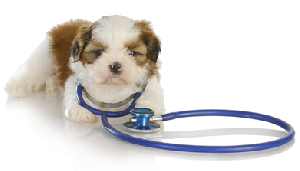Is Puppy Vomiting? What Should You do?
 Is your puppy vomiting?
Is your puppy vomiting?Puppy Vomiting can be scary for the new pet owner.
But before you panic, consider the fact that the most common cause of vomiting is a puppy who has eaten something he should not have ingested.
However, there are real emergencies associated with vomiting, so no case should be taken lightly.
Reasons Why Puppies Vomit
The list becomes extensive when you consider all the possibilities, but thankfully, in puppies it is usually a matter of some change in the diet. Dogs will vomit due to the following.
- GI tract infection: Yes dogs can get symptoms similar to people who have picked up a bug of some kind.
- Change in diet: A sudden change in diet from one type of food to another or even the introduction of people food may trigger a response.
- Food Allergy:
Some puppies have allergies to certain foods. Food allergies often
present themselves in many disguised ways such as skin rash, but
occasionally a puppy might vomit because he is allergic to something in
the food. Food sensitivity is another possibility.
- Ingestion of something the puppy should not eat
(garbage, poison of some kind) Puppies are notoriously curious and will
investigate anything new by putting it in their mouth. When they
swallow something toxic, they are likely to vomit.
- Swallowing a foreign object: The dog swallowed an object such as a toy, piece of bone, a large piece of mulch piece of wood or cloth: Small dogs that swallow something they should not have eaten such as a toy, stone, piece of wood or part of the bone, the object may have lodged somewhere along the GI tract causing a blockage and subsequent vomiting.
- Eating Grass: Research has not determined the exact cause of puppies eating grass but if a puppy eats too much, it may cause vomiting.
- Eating too fast: Sometimes puppies gobble down their food so quickly that the action triggers the gag reflex and the meal comes right back up.
- Not eaten for a while: Puppies with empty stomachs, do not eat regularly, or have long periods between meals may vomit a yellow substance (bile).
- Intestinal Parasites: If the puppy has not been wormed properly, sometimes a bad infestation will cause the pup to vomit.
- Viral infections such as Parvo can also cause puppies to vomit.
- Reacting to a Medication: The reaction to some medications such as aspirin or antibiotics may cause a puppy to vomit.
- Carsickness is common in puppies, especially those that have eaten a large meal just prior to traveling. First car rides can be stressful to some puppies and the combination of a big meal, the sensation of moving, and the stress combine to cause puppy vomiting.
- Heatstroke, one sign that the puppy has experienced a heat stroke is vomiting. This would be a medical emergency.
- Acute liver or kidney failure (usually older dogs).
- Vomiting in older dogs may be associated with infected uterus (older non-spayed females), pancreatitis, acute liver or kidney failure or cancer.
First, You should determine the cause of puppy vomiting.
Many simple cases of puppy vomiting can be solved by the puppy’s owner through close observation and thorough check of what the puppy was doing just prior to the vomiting episode. Often the color or type of the vomitus will give you a clue.
If your puppy throws up his food soon after a meal, he may be eating too quickly, eating too much or eating something that does not agree with him. Feed less and allow that to digest before completing the meal.
If there is food intolerance causing the vomiting, then the treatment is a little trickier. Food intolerance is different from a food allergy.
Allergies usually show up as skin problems. When a dog cannot tolerate a particular food, he is likely to vomit. Common culprits that are found in most dog foods include corn, wheat, soy, eggs, chicken, beef, fish, or lamb. The way to determine what might be causing the problem is to put the puppy on an elimination diet
Does the puppy vomit after exercise? It may be that the puppy is exercising too soon after mealtime. A simple remedy for this is to wait 20-30 minutes before any exercise or boisterous play.
A yellow or greenish substance without any traces of food is likely bile coming up. The cause is usually an empty stomach, however, in rare instances; it could be the result of intestinal infection. If this happens frequently, a change in the diet plan will likely resolve the problem.
If you are feeding once per day, feed twice a day. If your puppy is eating twice a day, go to feeding three times a day. If this does not resolve the vomiting problem, add a snack in between meals. You do not want to add more food to your dog’s stomach, just spread out what he is already eating.
What Should You Do?
First, You should determine the cause of puppy vomiting.
Many simple cases of puppy vomiting can be solved by the puppy’s owner through close observation and thorough check of what the puppy was doing just prior to the vomiting episode. Often the color or type of the vomitus will give you a clue.
If your puppy throws up his food soon after a meal, he may be eating too quickly, eating too much or eating something that does not agree with him. Feed less and allow that to digest before completing the meal.
If there is food intolerance causing the vomiting, then the treatment is a little trickier. Food intolerance is different from a food allergy.
Allergies usually show up as skin problems. When a dog cannot tolerate a particular food, he is likely to vomit. Common culprits that are found in most dog foods include corn, wheat, soy, eggs, chicken, beef, fish, or lamb. The way to determine what might be causing the problem is to put the puppy on an elimination diet
Does the puppy vomit after exercise? It may be that the puppy is exercising too soon after mealtime. A simple remedy for this is to wait 20-30 minutes before any exercise or boisterous play.
A yellow or greenish substance without any traces of food is likely bile coming up. The cause is usually an empty stomach, however, in rare instances; it could be the result of intestinal infection. If this happens frequently, a change in the diet plan will likely resolve the problem.
If you are feeding once per day, feed twice a day. If your puppy is eating twice a day, go to feeding three times a day. If this does not resolve the vomiting problem, add a snack in between meals.
You do not want to add more food to your dog’s stomach, just spread out what he is already eating.
When Should You Take the Puppy to the Vet?
If your puppy has thrown up more than once or twice or is showing other symptoms such as lethargy, crying, refusing food or water, sensitive to touch or to show signs of being in pain, appearing to have some abdominal bloating, pale, or is having difficulty breathing, a call to the vet is in order.
Projectile vomiting is never a good sign, nor is dry heaving, retching, or gagging and a call to the vet is important. If this is caused by intestinal blockage, help is needed immediately. Additionally, if you notice blood or any home remedies you have administered are not working.
At the Vet's Office
If the puppy’s vomiting is more severe and you determine that a quick trip to the veterinary hospital is necessary, there are several things the veterinarian may do:
- Medical history
- Physical exam
- Check a fecal sample for worms
- Tests for Parvo
- Blood work
- X-ray or ultrasound
- Even exploratory surgery
What are some treatment options for puppy vomiting?
- Change feeding times
- Eliminate food intolerance
- Provide a Bland diet of boiled chicken and rice fed over the course of several days
- Fluids such as water or fluids to restore the electrolyte imbalance
What might the veterinarian recommend, in addition to the strategies above?
- Intravenous or subcutaneous fluid treatment
- Worming medication in the case of internal parasites
- to reduce vomiting
- Antibiotics if infection is present
"Hi, I'm Janice Jones, a former veterinary technician and Shih Tzu expert with over 40 years of experience with the breed. Through Miracle Shih Tzu, I combine my medical background and extensive breed knowledge to provide reliable, practical advice for Shih Tzu owners. My mission is to help you give your Shih Tzu the happiest, healthiest life possible through evidence-based information and real-world solutions. Whether you're new to the breed or a seasoned owner, you'll find trusted guidance here for all aspects of Shih Tzu care.
I hold an undergraduate degree in Psychology with a minor in biology, Early Childhood Education, and Nursing, and a Master's in Mental Health Counseling.




